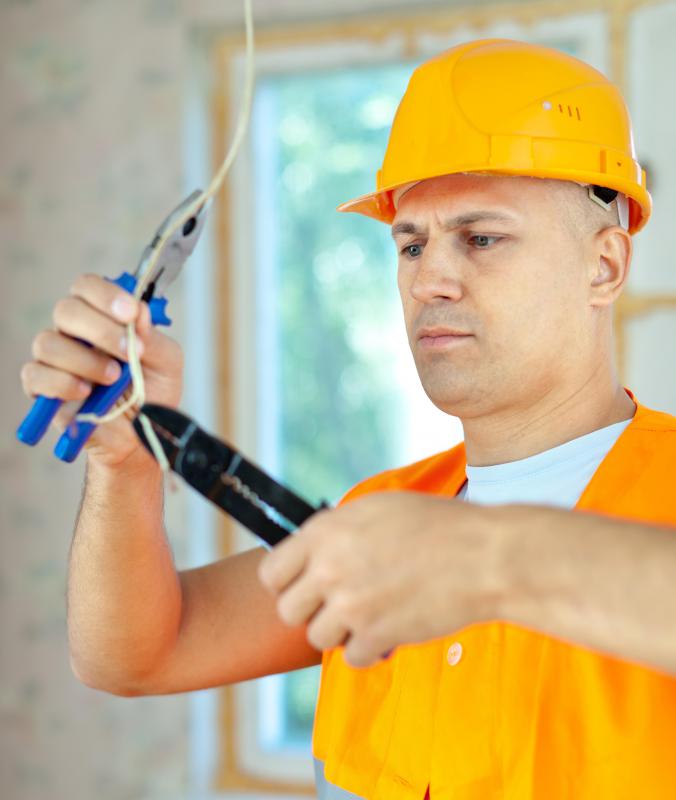At WiseGEEK, we're committed to delivering accurate, trustworthy information. Our expert-authored content is rigorously fact-checked and sourced from credible authorities. Discover how we uphold the highest standards in providing you with reliable knowledge.
What Are the Most Common Hazards of Home Wiring?
Home wiring — the networks of electrical wiring that make it possible to run electrical appliances in home settings — can be potentially hazardous because of the risk of fire and shock due to faulty outlets, inappropriate wattage, and outdated wiring. Certain animals can also create harmful conditions in home wiring. Individuals may want to have their wiring inspected regularly in order to prevent these conditions from developing.
Older homes built before the 1960s or 1970s may contain aluminum wiring. This type of wiring was considered to be a low cost alternative to copper wiring, but is no longer thought to be as safe. When old aluminum home wiring comes into contact with newer copper wires, the aluminum can potentially corrode, leaving a home vulnerable to fires and sparks. Special nuts can be installed at the juncture of these two types of wires to prevent corrosion from occurring.

Outlets that do not hold plugs well can be potentially hazardous. If an outlet cannot firmly secure an electrical plug, it usually means that the contacts within the outlets are old and must be replaced to avoid sparks and fires. Another hazard of home wiring that may put a home at risk for fire occurs when too many items are plugged into one outlet. This usually happens when a homeowner relies on power strips and extension cords because of a lack of outlets in the home.

Power outages and dimming or flickering lights may be experienced by many homeowners on a typical windy day, but these signs could also mean that there is a shorted wire in a home's outdoor fittings. The cables that carry electricity from the power pole to a home connect on a fitting. If the wires are loose or have shorted out in the fitting, every time the cables move in the wind, the home could lose power.

Animals like mice, raccoons, and other rodents can cause a great deal of harm to home wiring. These animals often chew on wires, which could allow the wires to spark and cause a fire. It is even more dangerous for home owners if the chewed home wiring is near a gas line or dry or rotten insulation.
Another potential wiring hazard can occur when an incorrect light bulb wattage is used in a lamp or light fixture. While a higher wattage may bring more light into a room, it can cause a lot of damage as well because of the heat it generates. It may melt the outlet it is plugged into, scorch the insulation, damage the wiring in the lamp and wall, or even cause a fire.
AS FEATURED ON:
AS FEATURED ON:















Discussion Comments
@Feryll - This is a guess, but you probably have a shorted wire in your light fixture, or you could be using the wrong wattage bulb as this article talks about. Either way, you need to get an electrician to come out and take care of the problem before you have a real problem.
If the breaker is tripping then that's a big warning sign. You would be surprised at the shoddy electrical work in some homes, especially older homes that were built before codes were as strict as they are nowadays. Some people also doing their own wiring when they have no real understanding of what they are doing. This is very dangerous.
We recently bought an old home. Much of the house was built in 1940. After that there were a couple additions. The first addition was added in the 50s and then another one was built around 1970. Before we bought the house we had a general inspection done and we were told that the wiring was okay, but needed some updating.
The other day, I pushed the light switch in the bathroom and I heard a pop. The light didn't come on and I tried the switch again and nothing happened. I checked the light switches in the hall and the two rooms near the bathroom and the switches weren't working.
I checked the breaker box and one was tripped, so I turned it back on. When I checked the lights in the hall and the other two rooms they worked. When I tried the bathroom light the same thing happened again.
What could cause the bathroom light switch to trip the breaker?
Post your comments